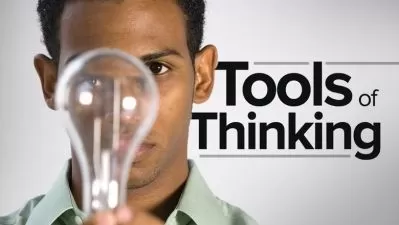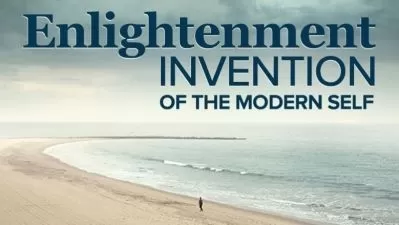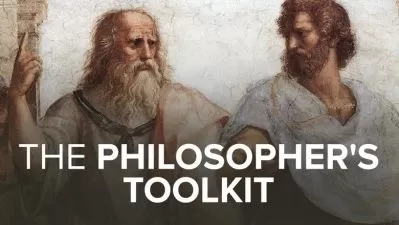The Modern Intellectual Tradition: From Descartes to Derrida
Lawrence Cahoone
18:49:33
Description
What is reality? It's a seemingly simple question. But penetrate beneath its surface and the simplicity drops away, a succession of subsequent questions luring you deeper—to where even more questions await. Ask yourself whether you can actually know the answers, much less be sure that you can know them, and you've begun to grapple with the metaphysical and epistemological quandaries that have occupied, teased, and tormented modern philosophy's greatest intellects since the dawn of modern science and a century before the Enlightenment.
During this rich period of philosophy, fascinating minds like Kant, Locke, Nietzsche, and Wittgenstein (to name but a few) struggled to improve our understanding of the world against the backdrop of unprecedented scientific, technological, and historical developments. The resulting tension brought forth a vast range of questions:
- Is the scientific view of the world compatible with human experience? And is the issue made more difficult by concepts like free will, moral responsibility, and religion?
- What is the mind's place in a physical world? And is the mind itself different from the brain?
- Is there such a thing as objective truth? What are the implications of the answer for politics, science, religion, and other aspects of human civilization?
And, ultimately, the most important question of them all:
- What is the ultimate nature of reality, and what are the limitations on our knowledge of it?
To understand the answers to these questions—as well as the ideas of the modern philosophers who asked them—is to amplify not only your understanding of the Western intellectual tradition, but of history and science as well. And you will likely become an even more astute observer of contemporary trends and events by developing broader and deeper perspectives from which to observe them.
The Modern Intellectual Tradition: From Descartes to Derrida offers you an introduction to the basics of modern and contemporary Western approaches to the philosophies of both reality (metaphysics) and knowledge (epistemology), right through the end of the 20th century, when some philosophers were even questioning the value of philosophy itself. Led by author and award-winning Professor Lawrence Cahoone of the College of the Holy Cross, these 36 lectures will take you on an engaging intellectual journey that encompasses prominent figures from all the major traditions of Western philosophy.
You'll explore the ideas behind modern philosophy's most important movements, including
- dualism, where much of modern philosophy began;
- rationalism, which views reason as the seat of all knowledge;
- empiricism, which views the senses as the source of all knowledge;
- idealism, where ideas formed the basis of the nature of reality;
- existentialism, the iconic 20th-century philosophy of alienation; and
- postmodernism, which radically refuses all notion of objective truth.
Just as important, you'll get a clear sense of how these and other movements fit into philosophy's broader progression—for example, the division into "analytic" and "continental" philosophy—to the present day.
Explore a Radical Period in Western Philosophy
Descartes, Locke, Spinoza, Hume, Kant, Hegel, Peirce, Nietzsche, James, Wittgenstein, Heidegger, Rorty, Derrida—these and the other minds you meet in this course are easily recognized today as among the most influential in human history. But this was not always the case.
While these thinkers were indeed shaped by the currents of thought that swirled around them and their ideas frequently respected and accepted, they were also often considered intellectual radicals, their views appreciated far less in their own era than in later ones. This is, in fact, a key reason why the work of so many of them has endured and why we still read them today.
Their unique perspectives on generally accepted ideas and frequently divergent views pushed philosophy in dramatically new directions. As intellectual radicals unwilling to passively accept the contemporary status quo, they offer an enduring bond of kinship with anyone who is eager to encounter new and challenging approaches to the most fundamental questions the human mind can seek to answer.
Draw New Connections between Philosophy, Science, and History
As Professor Cahoone notes, historical and scientific changes have driven the progress of modern Western philosophy. He points out the origins of modern philosophy among great social changes you might not expect to encounter in a philosophy course, including the discovery of the Americas, the decline of feudal aristocratic institutions, the growth of a commercial middle class, the Protestant Reformation, the growth of the nation-state, and the Scientific Revolution.
Similarly, throughout The Modern Intellectual Tradition, you'll be reminded repeatedly of the links connecting history, science, and philosophy, against a backdrop of further transformations such as the growth of liberal republicanism; the rise of industrial capitalism, Communism, and Fascism; and the scientific advancements of the 20th century. You learn how natural science grew out of what was once called natural philosophy, how the seeds of the social sciences were first planted in the soil of philosophical inquiry, and why Professor Cahoone believes that it is philosophy itself that holds the key to reintegrating the divergent fields with which it has a bond.
Moreover, the course's focus on metaphysics and epistemology will strengthen your understanding of the entire process of "doing" philosophy. For it gives you a chance to ask yourself the same question so many thinkers before you have had to confront as they pondered where the starting point of philosophy should be. And you may well find, as so many of them have, that your answer depends on just which aspect of an increasingly complex world you have foremost in mind.
Meet Some of Modern Philosophy's Greatest Minds
One of The Modern Intellectual Tradition's great strengths is the skill with which Professor Cahoone conveys both an understanding of the new and sometimes complex directions offered by the great minds in the course, and a glimpse into their human sides as well.
By presenting his portraits with clarity, an easy-going style, and constant attention to where each thinker fits into philosophy's historical matrix, Professor Cahoone demonstrates exactly why his teaching skills have been honored.
You learn, for example, that
- Baruch Spinoza, the Jewish philosopher whose presentation of "pantheism" helped reconcile the existence of God with Aristotle's metaphysics, was actually a lens-grinder and had at a young age been excommunicated from his synagogue as an accused atheist;
- Immanuel Kant—the great philosopher whose influence on Western philosophy is on a level with Plato, Aristotle, and Hegel—spent the first half of his life as a mathematical physicist whose only reported instance of being late for his daily constitutional was the day he first read Rousseau;
- Ludwig Wittgenstein, perhaps the most influential philosopher of the 20th century, was originally training to become an aeronautical engineer when he became so obsessed with questions of mathematical logic that he eventually abandoned his studies to learn under Bertrand Russell; and
- Alfred North Whitehead, convinced that metaphysics must keep pace with 20th-century physics, developed an alternative formulation of Einstein's general relativity with empirical predictions that initially performed just as well as Einstein's.
With The Modern Intellectual Tradition, you'll get to experience these and many other great thinkers, both individually and together, from all the major traditions of modern Western philosophy. All you need to bring is your own curiosity about how you can know the world. From there, you'll learn how the things you know come together and discover the implications that come with whatever position you take on the world around you.
As centuries of thinkers before you have learned, it's a journey of unending wonder.
More details
User Reviews
Rating
Lawrence Cahoone
Instructor's CoursesDr. Lawrence Cahoone is Professor of Philosophy at the College of the Holy Cross in Worcester, MA, where he has taught since 2000. He holds a Ph.D. in Philosophy from the State University of New York at Stony Brook. A two-time winner of the Undergraduate Philosophy Association Teaching Award at Boston University who has taught more than 50 different philosophy courses, Professor Cahoone is not only a skilled teacher, but also an author. With a background in recent European, American, and social and political philosophy, as well as interests in postmodernism, metaphysics, and the latter's relation to the natural sciences, he has written:
- The Orders of Nature
- Cultural Revolutions: Reason versus Culture in Philosophy, Politics, and Jihad
- Civil Society: The Conservative Meaning of Liberal Politics
- The Ends of Philosophy: Pragmatism, Foundationalism, and Postmodernism
- The Dilemma of Modernity: Philosophy, Culture, and Anti-Culture
He edited From Modernism to Postmodernism: An Anthology and his play, Wise Guys: A Philosophical Comedy, is available at HeartlandPlays.com

The Great Courses
View courses The Great Courses- language english
- Training sessions 37
- duration 18:49:33
- English subtitles has
- Release Date 2023/06/06





















